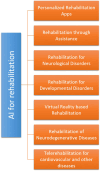Impact of AI-Powered Solutions in Rehabilitation Process: Recent Improvements and Future Trends
- PMID: 38495919
- PMCID: PMC10944308
- DOI: 10.2147/IJGM.S453903
Impact of AI-Powered Solutions in Rehabilitation Process: Recent Improvements and Future Trends
Abstract
Rehabilitation is an important and necessary part of local and global healthcare services along with treatment and palliative care, prevention of disease, and promotion of good health. The rehabilitation process helps older and young adults even children to become as independent as possible in activities of daily life and enables participation in useful living activities, recreation, work, and education. The technology of Artificial Intelligence (AI) has evolved significantly in recent years. Many activities related to rehabilitation have been getting benefits from using AI techniques. The objective of this review study is to explore the advantages of AI for rehabilitation and how AI is impacting the rehabilitation process. This study aims at the most critical aspects of the rehabilitation process that could potentially take advantage of AI techniques including personalized rehabilitation apps, rehabilitation through assistance, rehabilitation for neurological disorders, rehabilitation for developmental disorders, virtual reality rehabilitation, rehabilitation of neurodegenerative diseases and Telerehabilitation of Cardiovascular. We presented a survey on the newest empirical studies available in the literature including the AI-based technology helpful in the Rehabilitation process. The novelty feature included but was not limited to an overview of the technological solutions useful in rehabilitation. Seven different categories were identified. Illustrative examples of practical applications were detailed. Implications of the findings for both research and practice were critically discussed. Most of the AI applications in these rehabilitation types are in their infancy and continue to grow while exploring new opportunities. Therefore, we investigate the role of AI technology in rehabilitation processes. In addition, we do statistical analysis of the selected studies to highlight the significance of this review work. In the end, we also present a discussion on some challenges, and future research directions.
Keywords: artificial intelligence; cognitive rehabilitation; cognitive skills; healthcare; machine learning; rehabilitation.
© 2024 Khalid et al.
Conflict of interest statement
The authors report no conflicts of interest in this work.
Figures












References
-
- Novakovic-Agopians T, Abrams G. Cognitive rehabilitation therapy. In: Aminoff MJ, Daroff RB, editors. Encyclopedia of the Neurological Sciences. second edition ed. Oxford: Academic Press; 2014:824–826.
-
- Rai S, Misra D, Misra A, Jain A, Bisla S. Impact of oral health factors on quality of life of geriatric population - a systematic review. J Indian Acad Oral Med Radiol. 2021;33:453. doi:10.4103/jiaomr.jiaomr_98_20 - DOI
-
- Naeem M, Coronato A, Paragliola G. Adaptive treatment assisting system for patients using machine learning. In: 2019 sixth international conference on social networks analysis, management and security (SNAMS). IEEE; 2019:460–465.
Publication types
LinkOut - more resources
Full Text Sources

